Can Wesley Thompson Bring His Medical Skills to Ecuador?
Last activity 13 April 2015 by cccmedia
2138 Views
15 replies
Subscribe to the topic
Post new topic
On the New Members thread, Wesley Thompson of North Carolina expressed his interest in moving to Cuenca and finding a position there to employ his medical skills.
Wesley has been a physicians assistant for 28 years, according to his post, and specializes in HIV/AIDS as a board certified specialist. Also, he has been teaching at the local med schools and universities and does HIV/AIDS clinical research.
The Correa Administration has been on a campaign to bring home medical professionals from abroad -- Ecuadorian nationals -- and you might think Ecuador would broadly welcome someone with Wesley's training and experience as well.
Keep in mind, though, that the ministry or Cancillería requires that professional-class visa applicants with a background such as Wesley's pass the Ecuadorian equivalent of the certification exam that Wesley earlier passed in the United States. Naturally, the EC exam would be in Spanish.
So Wesley may want to determine what exam the Cancillería will require and whether he can master enough español medical terminology to 'meet the bar.'
Ecuador needs more medical professionals, and I wish Wesley luck in his plans.
The English-language website* for the ministry is:
www.cancilleria.gob.ec/visas-inmigrante/?lang=en
cccmedia in Quito
*If English does not appear immediately at the site, there is a green icon on the right side of the screen that may be used to switch languages.
I can only assume to become a medical professional in Ecuador, Wesley would have to pass qualifying exams which of course would be administered in Spanish. I would imagine that would take very good and specialized Spanish language skills to pass such certification.
Perhaps he could find another way to get a residency permit (investors visa?) and then set about studying for such an exam after he had polished up up his Espanol. Could take a couple of years of intensive study.
Perhaps he could find a 'grey market' place for himself in the meantime working with some health provider who needed English speaking assistance?
gardener1 wrote:Perhaps he could find a 'grey market' place for himself in the meantime working with some health provider who needed English speaking assistance?
That's an excellent idea, Gardener, and would seem to provide him an excellent opportunity, and to provide a service that a number of doctors who would like to tap into the lucrative expat market might welcome.
The legality of it is, of course, a whole 'nother matter.
I would like to add that I was considering retiring from the practice of medicine and maybe teaching or working in a clinic in another capacity. Just a thought. My Spanish will definitely need to improve before I could take a test in Spanish!
I like the sound of this"gray market". How do I research these areas?
As I mentioned on the reply to another post, how do I pursue this possible opportunity?
WesleyThompson wrote:I like the sound of this"gray market". How do I research these areas?
Probably with boots on the ground in Ecuador, seeking out health field sources. Without Spanish-language ability, you're hampered, though.
By definition, a gray market is unofficial and unauthorized -- though not illegal -- so the gray market for healthcare workers in Ecuador is less likely to lend itself to online research than most topics.
Any Expat who is succeeding in the gray market of Ecuadorian healthcare is probably street-smart savvy. If that's you, you may find a niche when you get here. Top Cat's idea of connecting with a healthcare provider that needs someone to assist English-speaking patients may be the best idea on this thread so far. 
Since you're not of retirement age and thus may not qualify for a pensioner visa, you still need to figure out where you fit in the visa puzzle. Absent español, the professional visa will probably be unavailable to you.
'Cat suggested an investment visa to buy time to stay in the country. The minimum investment is $25,000 in a bank CD. (Technically, a real estate investment would also suffice, but I can't see it in your case.) You can also stay for up to nine months on your 90-day tourist-stamp-on-arrival plus an extension visa.
If you haven't visited Ecuador up till now, consider making a visit before you make any serious plans. Of the Expat-favorable areas, Quito and Cuenca have the best medical facilities.
cccmedia in Quito
Americans are so cute (and I really mean that) they only know how to play by the rules. Somebody else makes the rules and everybody marches along in tune. There are so few countries in the world that operate this way that Americans are at a terrible disadvantage when faced with most other places where rules are something everybody generally ignores as much as possible. They're just trying to find a way to survive, any way that they can.
I don't suppose most of N. Americans have ever considered the huge employment 'grey market' which exists in their countries - and it is huge. Primarily domestic, service, and land laborers, but small businesses too, that operate completely off the grid. All of it through boots-on-the-ground connections. You know somebody who told somebody who knows somebody else that something or other is available in such and such a place.
This is how the real world actually works. Almost everywhere.
And they want cash in payment too, or they pay in cash. Real spendable money. Real world, real feet, real people, face-to-face business dealings in real time. (real time being a cultural measurement that varies widely)
I can live like that.
If someone can't operate under that lack of measurable standards, they will never survive outside of the very limited first world.
gardener1 wrote:Americans are so cute (and I really mean that) they only know how to play by the rules. Somebody else makes the rules and everybody marches along in tune. There are so few countries in the world that operate this way that Americans are at a terrible disadvantage when faced with most other places where rules are something everybody generally ignores as much as possible. They're just trying to find a way to survive, any way that they can.
I don't suppose most of N. Americans have ever considered the huge employment 'grey market' which exists in their countries - and it is huge. Primarily domestic, service, and land laborers, but small businesses too, that operate completely off the grid. All of it through boots-on-the-ground connections. You know somebody who told somebody who knows somebody else that something or other is available in such and such a place.
This is how the real world actually works. Almost everywhere.
And they want cash in payment too, or they pay in cash. Real spendable money. Real world, real feet, real people, face-to-face business dealings in real time. (real time being a cultural measurement that varies widely)
I can live like that.
If someone can't operate under that lack of measurable standards, they will never survive outside of the very limited first world.
Makes it difficult to get government money.
If everyone has health insurance, who is paying cash?
I work in medicine and have an online business. I've recently visited Ecuador. Having seen the country from that perspective, I'd personally suggest a different approach.
First, even experienced, well-paid physicians earn a fraction of what their US counterparts make. Yes, the cost of living is less, but the difference is still significant even after that's taken into account. For example, a $2K/month salary would be well above average and considered a very good job.
Second, as another poster mentioned, you would need to not just learn Spanish, but also familiarize yourself with medical Spanish, including medication equivalents, terminology, etc.
Third, there are few countries outside of the US which utilize the equivalent of Physician Assistants. Exactly how they would categorize you would be a challenge in and of itself.
And finally, your specialty makes you unique. That's both good and bad. As with being a specialist in the US, you would potentially be in great demand within certain communities, though the overall number of those communities are limited. I can only imagine that Ecuador is just like any other country, in that those with HIV will tend to move to larger metropolitan areas, simply out of necessity for the available medical resources. Essentially that means you'd be limited to Quito or Guayaquil. Nothing wrong with that, but again, relatively limited given the number of cities and regions throughout the country.
Instead, I'd recommend you work on securing a seasonal position within the US. Think Florida, especially south FL. The population there swells during the winter, and I'm sure there are infectious disease clinics who would love to have the help during the "snowbird" months. During those 5 months, you'd earn more than you'd otherwise earn all year long in Ecuador. Plus you'd have the opportunity to continue practicing Spanish, plus your home base would be an income-tax-free state, plus there are easy, low-cost flight to Ecuador.
Just my 2 cents.
languagetraveler wrote:work on securing a seasonal position within the US. Think Florida, especially south FL. The population there swells during the winter, and I'm sure there are infectious disease clinics who would love to have the help during the "snowbird" months. During those 5 months, you'd earn more than you'd otherwise earn all year long in Ecuador. Plus you'd have the opportunity to continue practicing Spanish, plus your home base would be an income-tax-free state, plus there are easy, low-cost flights to Ecuador.
The logic in this post is impeccable, especially as advice to someone willing to live a snowbird lifestyle for a while.
It eliminates the challenges that a residency-visa strategy entails.
Superior post, L.T. 
cccmedia in Quito
cccmedia wrote:languagetraveler wrote:work on securing a seasonal position within the US. Think Florida, especially south FL. The population there swells during the winter, and I'm sure there are infectious disease clinics who would love to have the help during the "snowbird" months. During those 5 months, you'd earn more than you'd otherwise earn all year long in Ecuador. Plus you'd have the opportunity to continue practicing Spanish, plus your home base would be an income-tax-free state, plus there are easy, low-cost flights to Ecuador.
The logic in this post is impeccable, especially as advice to someone willing to live a snowbird lifestyle for a while.
It eliminates the challenges that a residency-visa strategy entails.
Superior post, L.T.
cccmedia in Quito
Except the first 2 years he would be limited to 90 days out of country, not 5 months.
Excellent feedback. Thank you so very much!
mugtech wrote:cccmedia wrote:The logic in this post is impeccable, especially as advice to someone willing to live a snowbird lifestyle for a while....
It eliminates the challenges that a residency-visa strategy entails.
cccmedia in Quito
Except the first 2 years he would be limited to 90 days out of country, not 5 months.
Actually, he would not be limited by residency-visa restrictions, and that's the beauty of L.T.'s scenario.
Here's how it could work:
Wes gets a seasonal job in his specialty-area in Miami for five months, including the North American winter months.
When that gig ends, he flies from Miami to Quito, entering Ecuador as a turista on a three-month tourist stamp customarily granted to visiting North Americans.
He then can stay in Ecuador on the tourist stamp and an easy-to-obtain extension visa.
After approximately seven months in Ecuador, Wes then flies back to Miami for five months of seasonal work, as his employer from the previous year was pleased with his work and is glad to have him back for the Miami area's busy months.
Repeat process as desired.
The point is that to operate this way, Wes does not have to apply for an EC residency visa and so is not restricted by the out-of-country 90-day limit imposed on residency-visa holders.
cccmedia in Quito
Would make sense, getting 4 months of extensions every year is probably cheaper and less frustrating than going through the resident visa process. He could do that forever, or until they change the laws.
That's right, Mugtech.
And it's a strategy that can work for other potential snowbirds who don't qualify for permanent EC visas or who don't want to make a 25K investment.
Expat snowbirds can stay in Ecuador up to about nine months a year without a permanent visa -- through the 90-day tourist-stamp and a 180-day non-immigrant visa extension. In Wes's case, he only would need a four-month extension visa, but he actually could stay in La República another two months if desired.
cccmedia in Quito
Articles to help you in your expat project in Ecuador
 Healthcare in Ecuador
Healthcare in EcuadorEcuador, as a fast-developing nation, has laws that are constantly evolving, but one thing is certain: the ongoing ...
 Food in Ecuador
Food in EcuadorWhat kind of food will you find in restaurants, cafes, and private homes in Ecuador? Many restaurants in Ecuador ...
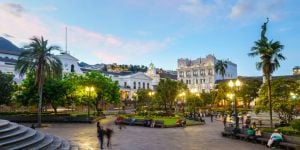 Work in Ecuador
Work in EcuadorEcuador is famous as a retirement haven. But you might not want to wait until retirement age to move there and ...
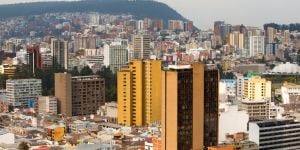 Opening a bank account in Ecuador
Opening a bank account in EcuadorA few years back, an expat would just breeze into an Ecuadorian bank, flash their passport and a bank account ...
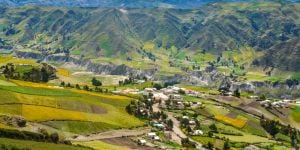 Family and children in Ecuador
Family and children in EcuadorFamily is everything to an Ecuadorian. The extended family unit is the most important aspect of life in Ecuador, ...
 The Working Holiday Visa for Ecuador
The Working Holiday Visa for EcuadorEcuador is truly a paradise for adventure and nature lovers, and thanks to the Working Holiday Visa program, they ...
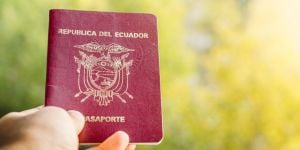 Permanent Residency in Ecuador
Permanent Residency in EcuadorEcuador is calling and you are ready to go and experience all that this gorgeous country has to offer. However, ...
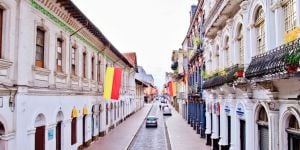 Work in Cuenca
Work in CuencaThere is no doubt that the Spanish colonial city of Cuenca is a wonderful place to call home, as demonstrated by ...
Find more topics on the Ecuador forum



